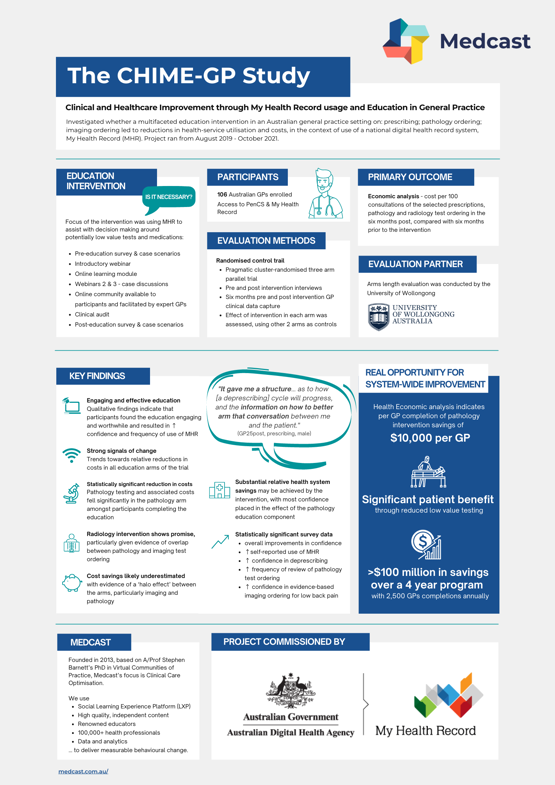GP Educational Intervention Improves Patient Care and My Health Record Usage with Potential to Save Government Millions
GP Educational Intervention Improves Patient Care and My Health Record usage, Could Save Government Millions
A two-year study titled CHIME-GP was carried out by Medcast and the University of Wollongong. It has shown that educating GPs about potentially inappropriate or unnecessary medicines, imaging and pathology test ordering in the context of using the My Health Record (MHR) can help reduce unnecessary ordering. This is great news for patients as unnecessary interventions are avoided. It is also great for the system, as the trial showed a significant reduction in costs, whilst helping to increase GP confidence and the frequency of use of MHR.
Commissioned by the Australian Digital Health Agency (ADHA), the study was designed to improve GP knowledge, change practice behaviour and improve clinical care, facilitate technology usage into routine care and result in tangible economic benefits. It looked at three distinct educational arms: pathology test ordering, low-back imaging test ordering and medication prescribing. It evaluated the effectiveness of a multifaceted educational intervention across these three arms to promote best practice and health cost savings, with a view to informing future policy making decisions and resource allocation.
Doctors from general practice settings across both urban and regional Australia were recruited to participate in the study. The CPD accredited education was conducted online via interactive webinars and online learning modules. After the study, an economic analysis was undertaken around the cost per 100 consultations of selected prescriptions, pathology and radiology test ordering. It compared costs in the six months prior to the education, to those six months afterwards. Strong signals of change appeared in each arm, with a significant reduction in pathology ordering amongst those that completed the education, resulting in projected savings of $10,000 per GP during the two years following the education. If rolled out to 2,500 GPs per year, this could save the health system an estimated $100 million over a 4 year program.
Another important finding was that following the education, GP participants were motivated to engage with MHR more and incorporate it into their practice routines. They reported more confidence in deprescribing medications and reducing test ordering, and had a very positive response overall to the educational program.
The CHIME-GP study makes an important contribution to the literature on healthcare quality improvement in the context of MHR, particularly given that there are few randomised controlled trials of quality improvement education interventions in primary care, and even fewer that assess economic outcomes. This study demonstrates that substantial health system savings may be achieved by this intervention, whilst also promoting best-practice clinical behaviour for GPs.


Kate is a Director at Medcast, leading education projects and partnerships dedicated to improving healthcare through innovative education. She began her career as an Occupational Therapist and has a Masters in Public Health. Kate worked in healthcare advisory services at KPMG, where she delivered evaluation, clinical redesign, and change-management services to government and NGOs.
Become a member and get unlimited access to 100s of hours of premium education.
Learn moreSepsis is a time-critical medical emergency. The National Sepsis Program urges GPs and primary care clinicians to enhance early recognition and management of sepsis to save lives. This update outlines key actions and available resources to support timely diagnosis and intervention across primary care settings.
Are you a general practitioner or health professional looking to enhance your knowledge and skills in treating veterans? Welcome to the VETs HeLP: Veterans Healthcare eLearning Platform.
Medcast is thrilled to announce a new collaboration with the University of Wollongong’s Graduate School of Medicine. The $2.7M MRFF grant focuses on reducing the inappropriate prescription of antibiotics, a key factor in the development of antimicrobial resistance (AMR).

